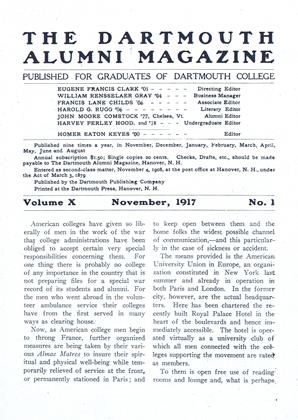At the annual meeting of the Webster Birthplace Association held in Concord on October 13, it was voted to transfer to the State of New Hampshire the title to, and future control of the Daniel Webster birthplace, upon the understanding that the property will be cared for and maintained forever by the State in Webster's memory. The president or either vice-president of the association was authorized to execute the deed. The association, which was formed in 1904 and which restored and dedicated the birthplace in 1913, had previously voted that the purpose for which it was organized, the preserving of the birthplace as a memorial, could be best accomplished by vesting the ownership in the public. The city of Franklin was therefore offered the trust, but refused it; the last Legislature of New Hampshire, however, passed a bill authorizing the Governor and Council to accept it.
The following description of the property thus transferred is taken from an article, in the Boston Evening Transcript for October 17:
"The property which now becomes a State memorial to its most distinguished son, is by no means imposing in appearance. The house stands under gigantic trees, its weather-worn clapboards making an agieeable patch of gray in a kaleidoscopic burst of autumnal color. The back of the house stands toward the road, for the house was first reached by a footpath along the picturesque Punch Brook, whose tumbling waters once moved a mill wheel in front. The structure is one-story, with a low roof, the squatty attic being lighted by a single window. The door is opened for you by young Leo Scully, whose cognomen suggests the newer American, but whose shining morning face proclaims him as duly cognizant of the importance of his function as keeper of this shrine. There are but two rooms beside the attic. The former contains only the great fireplace upon the mantel of which are arranged objects once in Daniel Web-ster's possession. A tin "baker" is set on the floor in front, along with the great warming pan, fire shovel, bellows, tongs and axes, and a kettle hangs from the stout crane. Every object in the room breathes the spirit of antiquity, and the old door latch of the front door is of iron, hand wrought by Andrew Pettengill, the first blacksmith in Salis-bury. A saw from the old mill, now only a memory, stands by the fireplace. In the other room are the rude chairs, tables and bedstead of the original Webster house as Daniel saw them in his infancy. The wainscoting is of pine boards laid edgewise, three feet across, without a knot. Over the fireplace hangs the flintlock musket of the old training days, for not using which on muster occasions Daniel's brother, Eze-kiel, was fined twice.
"Adjoining the main: building is a shed, slightly lower in height, and with one side open to thes elements. But the character of the shed is notable. Mere utility was not the only consideration of its builder. The entrance is crowned by the graceful curve of an arch, and the workmanship of the finish boards shows that no slovenly hand wrought upon the structure. Beside the shed, or nearly in front, is the old well, with its long well-sweep and "old oaken bucket," from which water was drawn for the family's use. The staves and bottom of the bucket are the original ones, having been found in the debris of the cellar, where were also uncovered some of the domestic articles in use in 1782. There is something rugged and heroic about the building, in spite of its diminutive proportions, and from its well-walled cellar to its low attic there is the color of age, the rocks a soft gray, the bricks a dull red, the woodwork a rich brown which cannot be imitated except by the hand of Time. In preserving this as a State memorial forever, New Hamp- shire has added another to its manifold attractions for summer visitors and preserves for all time what Governor McCall designated as 'a memorial and a shrine—where patriotic Americans and lovers of liberty from all lands can gain inspiration for the duties of citizenship and renew loyal devotion to the fundamental principles of a government that typifies what the great Lincoln declared it to be, a government "of the people, for the people and by the people".' "
 View Full Issue
View Full Issue
More From This Issue
-
 Article
ArticleA LETTER FROM THE FRONT
November 1917 -
 Article
ArticleTHE NEED FOR UNUSUALNESS IN THE WORK OF THE COLLEGE
November 1917 By Hopkins -
 Article
ArticleAmerican colleges have given so liberally of men
November 1917 -
 Article
ArticleDARTMOUTH WAR RECORD
November 1917 -
 Article
ArticlePLATTSBURG-A TRIUMPH OF EFFICIENCY AND DEMOCRACY
November 1917 -
 Books
BooksArgumentation and Debate
November 1917 By WARREN CHOATE SHAW
Article
-
 Article
ArticleTHADDEUS STEVENS 1814
November 1920 -
 Article
ArticleCLASS SECRETARIES MET IN HANOVER APRIL 22, 23
May 1921 -
 Article
ArticleHarvard Business School
January 1936 -
 Article
ArticleTuck School
FEBRUARY 1972 By BOB KIMBALL T'48 -
 Article
ArticleFreshman: Homesick
September 1993 By G.A. Green, 1898 -
 Article
ArticleCLASS OF 1878
June 1916 By William D. Parkinson


